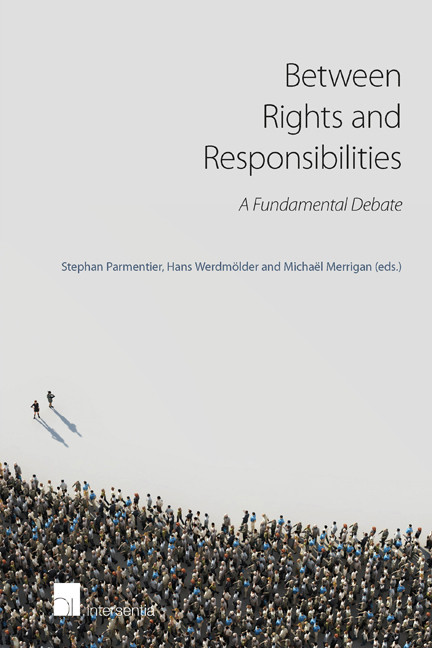Book contents
- Frontmatter
- Foreword
- Contents
- About the Authors
- Introduction: Towards an Integrated Vision of Rights and Responsibilities
- PART I FUNDAMENTAL RIGHTS AND FUNDAMENTAL RESPONSIBILITIES: SETTING THE SCENE
- PART II RIGHTS AND RESPONSIBILITIES IN SPECIFIC CONTEXTS
- Human Rights in a Globalising Economy. Is the Right to Social Protection Qualified by a Duty to Work?
- Human Rights in a Globalising Economy. Rights and Responsibilities of Trade Unions
- Fundamental Rights and Responsibilities within a Multicultural Society
- From Lawless to a Human Rights Approach in the Fight Against Terrorism. The Council of Europe Standards
- Children's Rights at a Dignitarian Horizon of Responsible Parenthood
- Individuals’ Duties in the African Human Rights Protection System. Challenges and Prospects
- Declaration of Human Duties and Responsibilities
Fundamental Rights and Responsibilities within a Multicultural Society
from PART II - RIGHTS AND RESPONSIBILITIES IN SPECIFIC CONTEXTS
Published online by Cambridge University Press: 22 November 2017
- Frontmatter
- Foreword
- Contents
- About the Authors
- Introduction: Towards an Integrated Vision of Rights and Responsibilities
- PART I FUNDAMENTAL RIGHTS AND FUNDAMENTAL RESPONSIBILITIES: SETTING THE SCENE
- PART II RIGHTS AND RESPONSIBILITIES IN SPECIFIC CONTEXTS
- Human Rights in a Globalising Economy. Is the Right to Social Protection Qualified by a Duty to Work?
- Human Rights in a Globalising Economy. Rights and Responsibilities of Trade Unions
- Fundamental Rights and Responsibilities within a Multicultural Society
- From Lawless to a Human Rights Approach in the Fight Against Terrorism. The Council of Europe Standards
- Children's Rights at a Dignitarian Horizon of Responsible Parenthood
- Individuals’ Duties in the African Human Rights Protection System. Challenges and Prospects
- Declaration of Human Duties and Responsibilities
Summary
INTRODUCTION
In Western European multicultural societies in the last few years, rights collisions have become daily practice. Especially the right to freedom of religion and freedom of expression are the talk of the town. Are discriminatory statements on homosexuals under the banner of the freedom of religion acceptable? Does the right to freedom of expression also imply the right to offend, a question that was raised in the debate on the Danish cartoons. Does the right to freedom of religion also legitimate that an orthodox Islamic employee may refuse to shake hands with someone of the opposite sex?
In Dutch constitutional law circles, the answers to these questions tend to be in the affirmative. Rights such as the two aforementioned are commonly viewed as the most fundamental ones in a liberal-democratic state. By restricting them too easily, one would endanger rule of law fundamentals. Consequently, these rights are commonly seen as rather absolute ones. It is up to the rights bearer himself to decide how to make use of these rights. In my contribution to this book, I will critically comment on this view. It seems to me that these two rights – fundamental though they may be – should always be exercised responsibly.
In order to elucidate this proposition, my point of view will be a legalphilosophical one. The examples will be taken from the Dutch legal setting. In section 2, the stage will be set up by providing some analytical clarification on the nexus between rights and responsibilities. In the next section, I will argue that the current Dutch discourse commonly presupposes a rather absolute view of constitutional rights. In section 4, by way of comparison, I will sketch some developments in the private law doctrine on ownership. From an absolute and sacrosanct right in the 18th century, this right has gradually evolved into a right that is principally qualified by doctrines such as rights abuse. Likewise, we may argue that the rights to freedom of expression and of religion may not be abused. In section 5, the currently absolute interpretation of these rights will be critically assessed. In the next section, we will return to practice. The three rights collisions mentioned at the beginning of this chapter will be scrutinised in more detail. Were the rights to freedom of expression and of religion exercised responsibly here or can one speak of rights abuse?
- Type
- Chapter
- Information
- Between Rights and ResponsibilitiesA Fundamental Debate, pp. 125 - 140Publisher: IntersentiaPrint publication year: 2016

